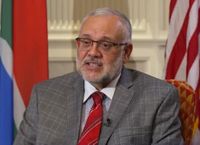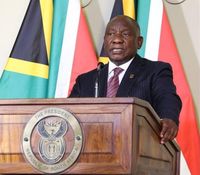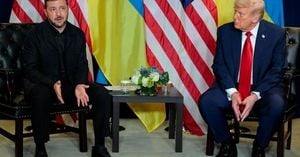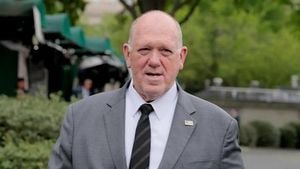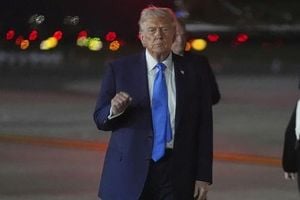In a recent statement, South African President Cyril Ramaphosa expressed concern regarding remarks made by former U.S. President Donald Trump, who suggested that South Africa was under scrutiny for being on a so-called "watch list." Trump, during his statements this week, indicated that South Africa was facing increased attention due to unspecified issues. This comment seems to have raised alarms within the South African government, leading Ramaphosa's spokesperson, Vincent Magwenya, to officially address Trump's assertion.
Magwenya stated that President Ramaphosa is worried about the implications of Trump’s words on South Africa's international standing. He emphasized the need for clarity on the situation, as Ramaphosa took Trump's comment seriously, indicating that it could hinder South Africa's reputation on the world stage.
These kinds of statements from influential political figures can have significant impacts on diplomatic relations and perceptions. The suggestion that a country is under a watch list can usher in a flurry of concerns regarding its governance, human rights track record, or other socio-economic challenges. Therefore, Ramaphosa’s apprehension highlights the potential repercussions such comments could have.
While specifics about what criteria led to Trump’s claim remain unclear, the awareness of the existing tensions between Trump’s administration and various global leaders underscores a broader pattern of geopolitical rhetoric that can influence public perception. Various leaders often vocalize their opinions about international affairs, and Trump's declarations often reflect isolationist tendencies which resonate with certain voter bases in the U.S.
This incident follows a series of controversial statements made by Trump that have drawn scrutiny from abroad, with several nations expressing discomfort at his approach to international diplomacy. South Africa, known for its rich cultural heritage and strategic position on the African continent, has cultivated a diverse set of partnerships globally, including with the United States.
The tensions stemming from Trump's comments and Ramaphosa’s reaction could possibly impact U.S.-South Africa relations. Historically, relations between the two nations have been complex, weaving through significant political changes in both countries. The U.S. has expressed interest in South Africa's potential as a key player on the continent.
In a world where diplomacy is increasingly fragile, Ramaphosa's response indicates an underlying concern about how public statements from foreign leaders can shape the narrative surrounding one’s country. It acts as a reminder that in international politics, narrative matters as much as actions. The mere mention of being on a watch list or facing scrutiny can cast a long shadow, inviting speculation and concern that might take years to mitigate.
This latest episode illustrates the delicate nature of international relations in the modern era, demonstrating how words can wield as much power as actions. Ramaphosa is likely to advocate for proactive communications and engagement with international partners to safeguard South Africa's image while avoiding the pitfalls presented by politically charged statements from prominent figures like Trump.
As South Africa navigates these turbulent waters of geopolitical discourse, the emphasis will be on maintaining a steady course, looking to reinforce its international partnerships while also addressing any adverse narratives that arise. President Ramaphosa's decisive stance in addressing Trump's comments reflects a commitment to protect the dignity and reputation of South Africa on the world stage.
Moving forward, how South African officials choose to respond to similar incidents will be critical in shaping the nation’s foreign relations. As global interactions become ever more critical, the need for transparent and effective communication remains paramount to managing perceptions and expectations in a rapidly evolving political landscape.
